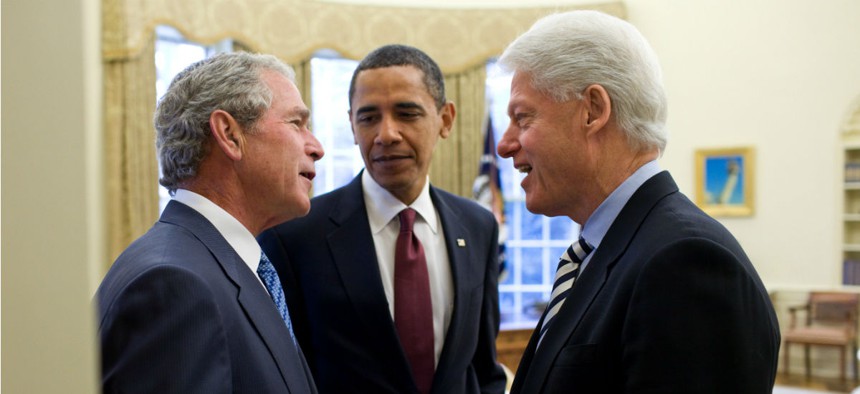
President Obama discusses relief efforts for Haiti with former Presidents Bush and Clinton in January 2010. White House Photo by Pete Souza
Reformers Gear Up to Smooth the Next Presidential Transition
National Academy to push continuity of nonpolitical management disciplines.
With presidential candidates already crowding the campaign trail, it can hardly be too early for good-government groups and lawmakers to prepare to work with the eventual nominees from both parties to help assure some continuity of management during the 2016 post-election transition.
On Monday, the nonprofit National Academy of Public Administration announced the launch of its Presidential Transition 2016 initiative, a multi-organization push led by veterans of past transitions designed to define and overcome government management challenges while identifying key positions requiring presidential appointments.
“Good management is good politics,” said co-chair Ed DeSeve, a budget official during the Obama and Clinton administrations now eyeing his fifth presidential transition. “NAPA is neither a political or policy group, but has learned that it is possible to effect good transitions using management.”
David Chu, the other co-chair who was undersecretary of Defense for personnel and readiness during the George W. Bush administration, told reporters that “management tends to be something to think about afterward, after a program has gone off the rails, but it should be part of the process to ask whether the program will produce the outcomes sought or unintended consequences.”
To seek solutions to such perennial transition problems as delays in fulfilling vacancies and tension between career employees and new political appointees, NAPA is cooperating with the American Society for Public Administration in offering management recommendations, with additional sponsorship from the American University School of Public Affairs Executive Leadership Program. In addition, Ernst and Young LLP is providing help with inventorying and highlighting presidentially appointed positions. The NAPA leaders will also keep in touch with the nonprofit Partnership for Public Service’s “Ready to Govern” initiative.
All of these co-sponsors are a “force multiplier, an unprecedented bench of experts,” said NAPA Chairman Robert Shea, a principal at Grant Thornton LLP. A key problem is that “there are too damn many Senate-confirmed positions,” Shea said, recalling that when he worked for the latter Bush administration to reduce the number of confirmation-required slots, many appointees “jealously guarded that as a privilege, though it was mysterious why.”
The often long, burdensome and politicized process—for which candidates must fill out long forms and undergo background checks—“is a shared problem to which the executive and legislative branches both contribute,” Shea added.
DeSeve stressed the need to get good advice to the White House personnel director, the “least known but most important” transition official.
NAPA’s launch comes just days after the Senate Homeland Security and Governmental Affairs Committee approved the 2015 Presidential Transitions Improvements Act, sponsored by panel Chairman Ron Johnson, R-Wis., and ranking member Tom Carper, D-Del. It would ensure that a senior-level, White House-led interagency transition council is in place at least six months before Election Day, and that a standing, working-level interagency group will develop an integrated strategy for transitions. The bill would also expand training for executives and clarify the transition duties of the General Services Administration.
Asked whether the next administration is likely to toss out its predecessor’s ideas and vocabulary just to paint a political contrast, the NAPA leaders said that historically that has often occurred. “But we’ll try to make sure that things are substantive,” DeSeve said, citing tools in the 2010 Government Performance and Results Modernization Act. “Exactly how one prepares a strategic plan is nuanced, and can be done in different ways. And we will stress the good things from previous administrations.”
Chu noted that continuity is provided by bodies such as the President’s Management Council and the Chief Human Capital Officers Council. “It’s important to look at what’s new and different and also to take a look back and review and see that as an opportunity to correct problems.”
Over the next year, the NAPA network will meet with staff at the Office of Management and Budget and in Congress, interviewing people and conducting forums to achieve a consensus on what works well, the leaders said. The two parties’ nominees will be approached once it becomes clear who those individuals will be.







